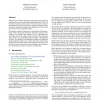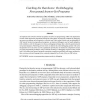13 search results - page 1 / 3 » Interpreting Loosely Encoded Questions |
AAAI
2004
13 years 6 months ago
2004
Knowledge-based question-answering systems have become quite competent and robust at answering a wide range of questions in different domains, however in order to ask questions co...
ICFP
2010
ACM
13 years 6 months ago
2010
ACM
We show how the binary encoding and decoding of typed data and typed programs can be understood, programmed, and verified with the help of question-answer games. The encoding of a...
FLAIRS
2008
13 years 7 months ago
2008
One of the central problems in building broad-coverage story understanding systems is generating expectations about event sequences, i.e. predicting what happens next given some a...
CORR
2010
Springer
13 years 5 months ago
2010
Springer
An important issue towards a broader acceptance of answer-set programming (ASP) is the deployment of tools which support the programmer during the coding phase. In particular, met...
SIGLEX
1991
13 years 8 months ago
1991
This paper argues for a two-level theory of semantics as opposed to a one-level theory, based on the example of the system of temporal and durationM connectives. Instead of identi...


